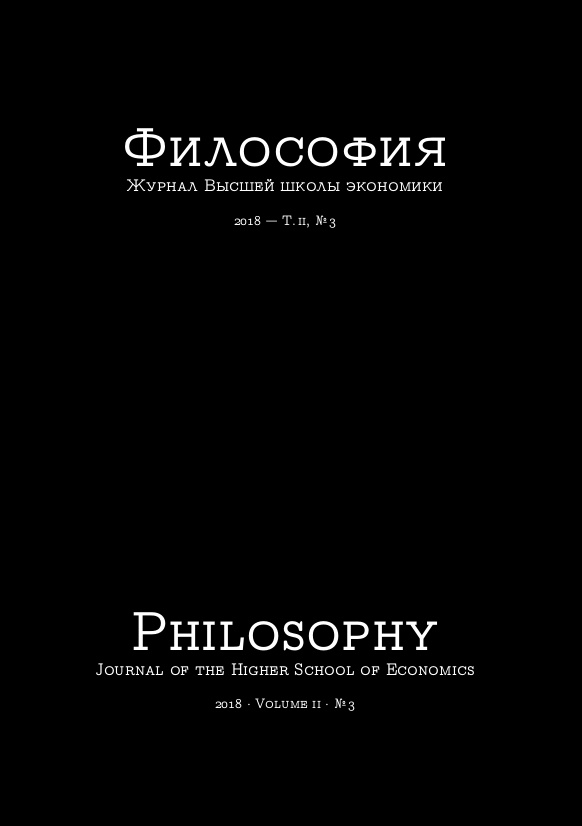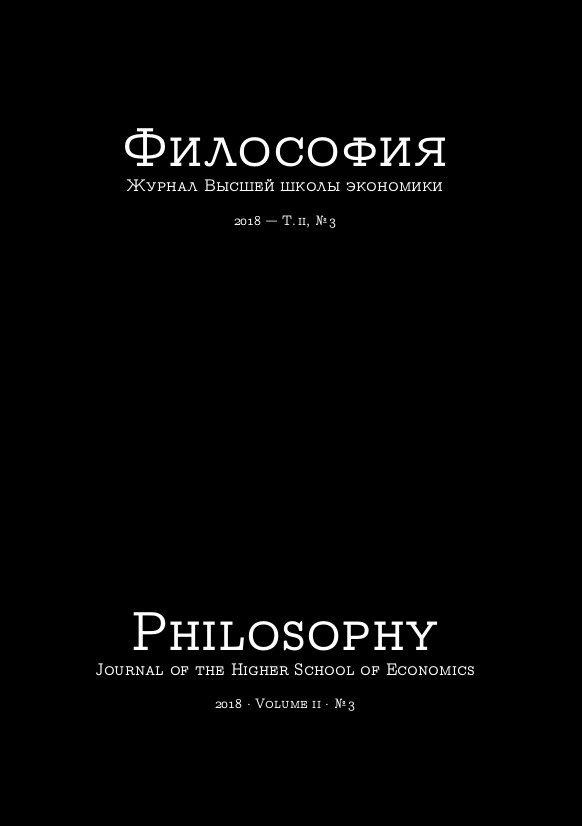
Western history of political ideas and languages includes several schools, gradually emerging within the national communities during the second half of 20th century: Michael Foucault’s discourse analysis, Reinhart Koselleck’s Begriffsgeschichte, and Quentin Skinner and John Pocock’s Cambridge school Q. Skinner and J. A. G. Pocock. By the end of the century the influence of historical studies alongside with the maturity of methodological reflection of all the three approaches created conditions for a more global academic dialogue — European and transatlantic. Russian history of political languages is even younger: it was forming during the last 30 years, while being influenced by aforementioned schools, and it is now actively looking for a more adequate scientific language of its own. In the present issue reader may find original research on the Russian and European history of ideas, as well as theoretical articles, written in a dialogue between several approaches.
Natural multidisciplinarity of the history of political languages makes it an academic field shared by historians, philologists, philosophers, lawyers, political philosophers and specialists in political science. This water truce is not due to a natural disaster or institutional violence: it is a result of a genuine interest of the representatives of humanities and social sciences to the same body of texts. However, same sources do not mean same methods. Rather, we can identify several common themes and moves which fit contemporary history of political concepts and languages into a much older tradition of humanities.
Attractiveness and relevance of the history of ideas is due to the nature of a certain type of discursive political communication — the one mediated through a web of interlinked philosophical and polemical texts, politicians’ decisions and adopted laws. Political communities allowing certain liberty of discussion on matters of government were typically drawn into conflictual debates on urgent issues and into an even more sophisticated discussion of the second order (not in Pocock’s sense). We are talking about metadiscussion, e.g. discussion of the principles and norms which can be legitimately referred to in the political debate on specific issues of the current political agenda. In this respect history of political languages points out the fundamental role of living written tradition (and its studies) as a long term factor, which significantly determines character and outcome of political debates.
A canon of widely recognized political texts is changing, but some classical treatises and the very principle of having a canon of great books, great authors and great texts remains. These texts are being reinterpreted by every new generation of politicians, lawyers, historians and philosophers. Historians tend to reconstruct tradition either as a continuous evolution (England) or as a sequence of discourses formed by two (Germany) or even several (France) radically different epochs. In both cases tradition is not seen as steady: it is changing and evolving under pressure of external and internal factors, speech-acts of the influential authors or interest-groups, social and epistemic shifts.
The consequence of these changes are shifts in the meanings of key idioms and concepts. However, the majority of historical actors ignore the scale and pace of semantic change and keep on addressing the well established old body of texts as a familiar source of legitimate arguments, norms and models. The three leading approaches to the history of political discourse see these linguistic ruptures as a central issue. Historical consciousness formed by the experience and language is another major topic for the history of ideas.
Changes, translations, blending, reconstruction and obliteration of the meanings of the allegedly familiar concepts in texts of the past and present are raison d’être for the history of political languages. Historian’s efforts to reconstruct forgotten meanings and contexts aim at gauging and filling the gap between languages of the present and languages of the past. When he succeeds, historian can revitalize the language of the long forgotten canon and make its repertoire available for a wider public. After that political philosopher, lawyer or politician can in his own way use this old/new language in the current configuration where power and institutions are contested. Historian, at the same time, highlights the limitations of our modern political vocabulary: the hidden from users acts of normative coding, neutralizing and decoding each of the key concepts. In so far as political and social institutions are indeed backed up by public arguments, principles of political philosophy, and written laws, and not only by unreflected practices and organized violence, critical work on the history of political language remains acute and relevant.
Vladimir Korshakov’s article helps us to see that a well-established opposition between the concepts of svoboda (freedom) and volya (will) in the present-day Russian political vocabulary had no roots in the Old Rus’. Moreover, volya was far more important legal and political term, referring to one’s autonomy and ability to act on his own. Maria Ponomareva reconstructs the context and meaning of the concept respublica in the medieval French political debates. The main object of her study are versions and translations from Latin into Middle French of the Dispute between a Priest and a Knight treatise. César Ruiz Sanjuán addresses liberal tradition, offering a new reading of John Mill’s arguments in his classical essay On Liberty, identifying strong arguments in favor of the positive liberty against Berlin’s famous stance. Andrey Teslya considers Reflections on the question of nationality by Sergey Bulgakov in the context of the debate between Russian liberals, conservatives and socialists in 1909–1910. In the final article of research section Timur Atnashev and Michail Velizhev describe methodology which can be a basis for a new Russian history of political languages.
Translations section opens with a classical article by John Pocock: Burke and the Ancient Constitution. Historian of political languages shows how legal thought and precedent-based law in England of early Modern period formed one of the most influential political philosophies of this country — traditionalist philosophy, which did not refer to Ancient Greek and Roman heritage. In the second article a well-known historian Claudio Sergio Ingerflom invites to consider the possibility to go beyond the dichotomy of rupture and continuity as natural categories to analyze the meaning of the Russian Revolution. The third text in this section is a translation from Latin of the treatise De modem et diverso written by Adelard of Bath in 11th century. Its translator and commentator Roman Shmarakov emphasizes optimism, erudition and wit with which ancient tradition asserted itself in the High Middle Ages, repeating the same thing in a way as to make the message clear for the audience. The closing text of this issue illustrates this point as well. In his engaging postmethaphisical review of the Russian translation of Dylan Trigg’s book The Thing: A Phenomenology of Horror Denis Shalagin uncovers the possibility to give voice and to hear the horror produced by the awareness of the alien primordial flesh — as it can (not) be experienced before the separation in (my, ours, subjective) human and (objective, bodily) natural worlds.
Timur Atnashev, Mikhail Velizhev






